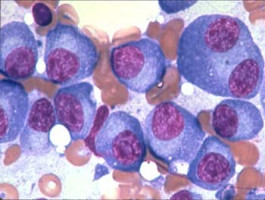
The first randomised trial to evaluate the use of a monoclonal antibody drug for treating newly diagnosed multiple myeloma shows that adding the drug, daratumumab, to one of the standard treatment regimens reduced the likelihood of disease progression or death by 50 percent.
The regimen also induced significantly deeper response and higher rates of negative minimal residual disease (MRD).
The Phase III trial, conducted in patients who were not eligible for a stem cell transplant, suggests daratumumab is a beneficial addition to one of the current first-line therapies for these patients.
Multiple myeloma is a cancer that starts in plasma cells, a component of the immune system.
Stem cell transplantation is used as intensification therapy in young patients.
For people who cannot receive a stem cell transplant, one standard treatment involves two chemotherapy drugs, bortezomib and melphalan, together with the steroid prednisone.
Daratumumab is a newer drug designed to directly target tumours while also equipping a patient’s own immune cells to attack the cancer cells.
It is approved for patients whose myeloma has relapsed after an initial course of treatment.
“Our results support that daratumumab in combination with bortezomib, melphalan, and prednisone should become a new standard of care in transplant-ineligible multiple myeloma patients,” said senior study author Jesus F. San-Miguel, MD, Medical Director of the Clínica Universidad de Navarra in Pamplona, Spain.
“Monoclonal antibodies like daratumumab have already been approved for use in relapsed patients; here, we are showing that the benefits extend to newly diagnosed patients, as well.”
The trial enrolled 706 patients.
All received nine 6-week cycles of the standard treatment regimen.
Half were randomly assigned to receive daratumumab along with the standard treatment and continued taking daratumumab once a month after the first nine treatment cycles.
To date, patients have been tracked for a median of 16 months.
In terms of the study’s primary endpoint, progression-free survival, patients receiving daratumumab showed a significantly (50%) lower rate of disease progression or death compared to those receiving standard treatment alone, a benefit that was consistent across all demographic and biologic subgroups.
This improvement appeared to be largely driven by a significantly better responsiveness to therapy, a higher rate of complete remission, and a tripling of the proportion of patients reporting MRD negativity.
Both study groups showed similar rates of adverse events with the exception of upper respiratory tract infections and pneumonia, which occurred somewhat more frequently in those taking daratumumab, but the majority of these resolved.
The trial is the first of several ongoing studies to evaluate daratumumab as a front-line treatment for newly diagnosed multiple myeloma to report results.
Source: ASH 2017
We are an independent charity and are not backed by a large company or society. We raise every penny ourselves to improve the standards of cancer care through education. You can help us continue our work to address inequalities in cancer care by making a donation.
Any donation, however small, contributes directly towards the costs of creating and sharing free oncology education.
Together we can get better outcomes for patients by tackling global inequalities in access to the results of cancer research.
Thank you for your support.